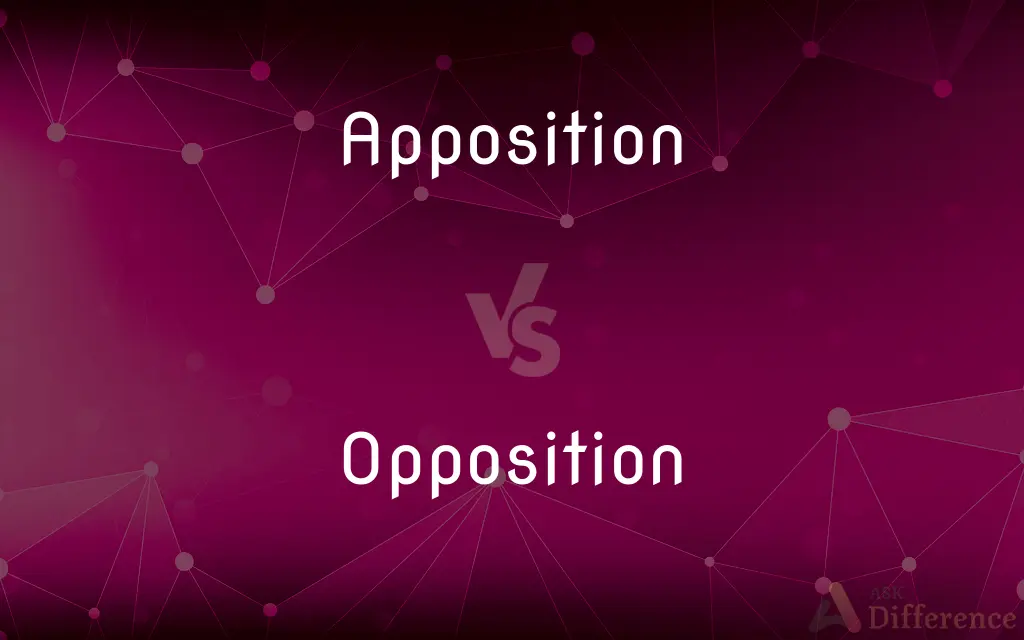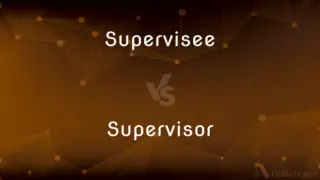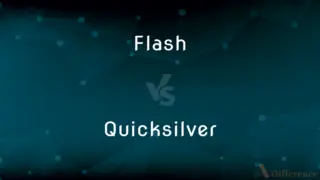Apposition vs. Opposition — What's the Difference?
Edited by Tayyaba Rehman — By Maham Liaqat — Updated on March 28, 2024
Apposition is a grammatical construction where two elements, typically nouns, are placed side by side, with one element serving to define. Opposition refers to a situation or relation of conflict, contrast, or antagonism between two or more entities.

Difference Between Apposition and Opposition
Table of Contents
ADVERTISEMENT
Key Differences
Apposition involves placing two language elements next to each other so that one element explains or clarifies the other. This construction is often used to add descriptive detail or to provide additional information about a noun without the use of a relative clause. For example, in the phrase "My brother, a doctor, lives in Boston," "a doctor" is in apposition to "My brother." In contrast, opposition denotes a relationship of contrast or conflict between ideas, forces, or entities. It is not limited to grammatical structure but refers to any scenario where two or more elements are set against each other, whether in ideas, political stances, or physical forces.
The concept of apposition is primarily linguistic, focusing on the way words or phrases are structured to convey meaning more precisely or richly. It is a syntactic feature that enriches textual coherence and depth. Opposition, on the other hand, can exist across various domains including politics, philosophy, and physics, representing a broad range of conflicts or dichotomies, such as the opposition between political parties or the oppositional forces in a scientific experiment.
In literature, apposition is a stylistic device used to enhance character descriptions or settings with additional details seamlessly integrated into the narrative. This enriches the text without the need for lengthy explanations. Conversely, opposition in literature can be a thematic element, driving the plot through conflicts between characters, ideas, or forces, and is fundamental to developing narrative tension and conflict resolution.
Understanding the difference between apposition and opposition is crucial for both language analysis and the interpretation of interactions in various fields. While apposition is about structural and semantic enhancement within language, opposition encompasses a broader range of contrasts and conflicts that propel action and change in both narrative and real-world contexts.
Both apposition and opposition serve important functions in their respective domains: apposition in language structures information in a clear, concise, and detailed manner, while opposition in broader contexts highlights differences and conflicts that can lead to resolution, change, or a deeper understanding of contrasting ideas or forces.
ADVERTISEMENT
Comparison Chart
Definition
Grammatical construction where elements define or modify each other
Relationship of conflict or contrast between entities
Domain
Linguistics
Various, including politics, philosophy, physics
Purpose
To add descriptive detail or clarify
To denote conflict or contrast
Example
"My friend, the artist, won an award."
Political parties in opposition
Significance
Enhances textual coherence and depth
Highlights differences and drives narratives or changes
Compare with Definitions
Apposition
Adds descriptive detail or clarification without a relative clause.
My cat, a Siamese, is very vocal.
Opposition
A situation or relation of conflict, contrast, or antagonism.
The proposal faced strong opposition from the community.
Apposition
Enhances the clarity and richness of language.
London, the capital of England, is bustling.
Opposition
Drives plots through conflict between characters or ideas.
The novel explores the opposition between love and duty.
Apposition
A grammatical construction where elements are side by side, with one defining or modifying the other.
The poet, a master of words, was honored.
Opposition
Highlights differences that propel action and change.
The debate highlighted the opposition between the two theories.
Apposition
Structures information clearly and concisely.
The treaty, an agreement of peace, ended the war.
Opposition
Denotes a broad range of conflicts or dichotomies.
In physics, forces in opposition cancel each other out.
Apposition
Used for detailed character or setting descriptions.
The old mansion, a remnant of a bygone era, stood silently.
Opposition
Exists in politics, philosophy, science, etc.
The senator voiced his opposition to the bill.
Apposition
Apposition is a grammatical construction in which two elements, normally noun phrases, are placed side by side and so one element identifies the other in a different way. The two elements are said to be in apposition, and one of the elements is called the appositive, but its identification requires consideration of how the elements are used in a sentence.
Opposition
The act of opposing or resisting.
Apposition
A construction in which a noun or noun phrase is placed with another as an explanatory equivalent, both having the same syntactic relation to the other elements in the sentence; for example, Copley and the painter in The painter Copley was born in Boston.
Opposition
The condition of being in conflict; antagonism
"The history of men's opposition to women's emancipation is more interesting perhaps than the story of that emancipation itself" (Virginia Woolf).
Apposition
The relationship between such nouns or noun phrases.
Opposition
Placement opposite to or in contrast with another.
Apposition
A placing side by side or next to each other.
Opposition
Something that serves as an obstacle.
Apposition
(Biology) The growth of successive layers of a cell wall.
Opposition
Often Opposition A political party or an organized group opposed to the group, party, or government in power.
Apposition
(grammar) A construction in which one noun or noun phrase is placed with another as an explanatory equivalent, both of them having the same syntactic function in the sentence.
Opposition
The position of two celestial objects when their longitude differs by 180°, especially a configuration in which the sun and a superior planet or the moon are on opposite sides of Earth.
Apposition
(grammar) The relationship between such nouns or noun phrases.
Opposition
The position of the superior planet or the moon in this configuration.
Apposition
The quality of being side-by-side, apposed instead of being opposed, not being front-to-front but next to each other.
Opposition
(Logic) The relation existing between two propositions having an identical subject and predicate but differing in quantity, quality, or both.
Apposition
A placing of two things side by side, or the fitting together of two things.
Opposition
(Linguistics) Contrast in a language between two phonemes or other linguistically important elements.
Apposition
(biology) The growth of successive layers of a cell wall.
Opposition
The action of opposing or of being in conflict.
The two politicians are in opposition.
Apposition
(rhetoric) Appositio, the addition of an element not syntactically required.
Opposition
An opposite or contrasting position.
Apposition
A public disputation by scholars.
Opposition
(astronomy) The apparent relative position of two celestial bodies when one is at an angle of 180 degrees from the other as seen from the Earth.
Apposition
(UK) A (now purely ceremonial) speech day at St Paul's School, London.
Opposition
(politics) A political party or movement opposed to the party or government in power.
Leader of the opposition
Apposition
The act of adding; application; accretion.
It grows . . . by the apposition of new matter.
Opposition
(legal) In United States intellectual property law, a proceeding in which an interested party seeks to prevent the registration of a trademark or patent.
Apposition
The putting of things in juxtaposition, or side by side; also, the condition of being so placed.
Opposition
(chess) A position in which the player on the move must yield with his king allowing his opponent to advance with his own king.
Apposition
The state of two nouns or pronouns, put in the same case, without a connecting word between them; as, I admire Cicero, the orator. Here, the second noun explains or characterizes the first.
Opposition
(logic) The difference of quantity or quality between two propositions having the same subject and predicate.
Apposition
A grammatical relation between a word and a noun phrase that follows;
`Rudolph the red-nosed reindeer' is an example of apposition
Opposition
The act of opposing; an attempt to check, restrain, or defeat; resistance.
The counterpoise of so great an opposition.
Virtue which breaks through all opposition.
Apposition
(biology) growth in the thickness of a cell wall by the deposit of successive layers of material
Opposition
The state of being placed over against; situation so as to front something else.
Apposition
The act of positioning close together (or side by side);
It is the result of the juxtaposition of contrasting colors
Opposition
Repugnance; contrariety of sentiment, interest, or purpose; antipathy.
Opposition
That which opposes; an obstacle; specifically, the aggregate of persons or things opposing; hence, in politics and parliamentary practice, the party opposed to the party in power.
Opposition
The situation of a heavenly body with respect to another when in the part of the heavens directly opposite to it; especially, the position of a planet or satellite when its longitude differs from that of the sun 180°; - signified by the symbol ; as,
Opposition
The relation between two propositions when, having the same subject and predicate, they differ in quantity, or in quality, or in both; or between two propositions which have the same matter but a different form.
Opposition
The action of opposing something that you disapprove or disagree with;
He encountered a general feeling of resistance from many citizens
Despite opposition from the newspapers he went ahead
Opposition
The relation between opposed entities
Opposition
The act of opposing groups confronting each other;
The government was not ready for a confrontation with the unions
The invaders encountered stiff opposition
Opposition
A contestant that you are matched against
Opposition
A body of people united in opposing something
Opposition
A direction opposite to another
Opposition
An armed adversary (especially a member of an opposing military force);
A soldier must be prepared to kill his enemies
Opposition
A political party opposed to the party in power and prepared to replace it if elected;
Her Majesty's loyal opposition
Common Curiosities
What is an example of apposition in a sentence?
"Alice, my best friend, moved to Canada."
What is an example of opposition in science?
Opposing forces in physics, like gravity and lift.
Can a sentence contain both apposition and opposition?
Theoretically, yes, but they serve different linguistic and thematic functions.
Can apposition be used for objects as well as people?
Yes, it can apply to any nouns, e.g., "Paris, the city of lights, is enchanting."
How is apposition identified grammatically?
By adjacent nouns or phrases where one explains the other, often separated by commas.
Can opposition lead to resolution?
Yes, in narratives and real-life conflicts, opposition can lead to resolution or deeper understanding.
Can apposition include pronouns?
Yes, but less commonly, and clarity must be maintained.
How does opposition manifest in politics?
Through differing ideologies and policies between parties.
How can understanding apposition improve language skills?
By enabling more precise and descriptive communication.
How do apposition and opposition differ in function?
Apposition clarifies or adds detail in language, while opposition denotes conflict or contrast.
Is opposition always negative?
Not necessarily; it can also drive positive change or clarify differences.
Why is apposition important in writing?
It adds richness and detail without cluttering sentences with extra clauses.
What role does opposition play in narratives?
It's crucial for creating tension and driving the plot forward.
What makes opposition a universal concept?
Its applicability across a wide range of disciplines and contexts.
How does opposition affect relationships?
It can cause strain but also foster dialogue and compromise.
Share Your Discovery

Previous Comparison
Supervisee vs. Supervisor
Next Comparison
Flash vs. QuicksilverAuthor Spotlight
Written by
Maham LiaqatEdited by
Tayyaba RehmanTayyaba Rehman is a distinguished writer, currently serving as a primary contributor to askdifference.com. As a researcher in semantics and etymology, Tayyaba's passion for the complexity of languages and their distinctions has found a perfect home on the platform. Tayyaba delves into the intricacies of language, distinguishing between commonly confused words and phrases, thereby providing clarity for readers worldwide.













































